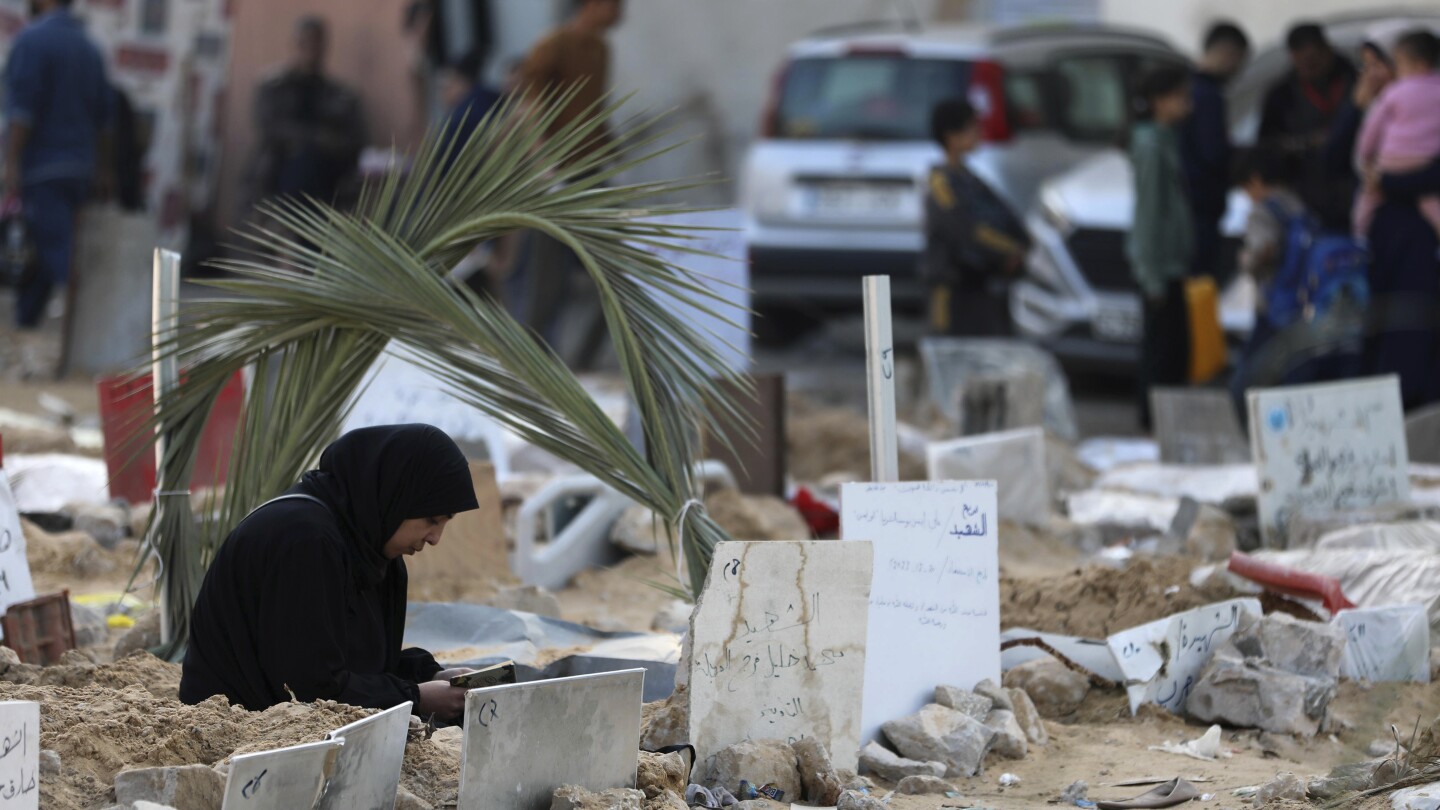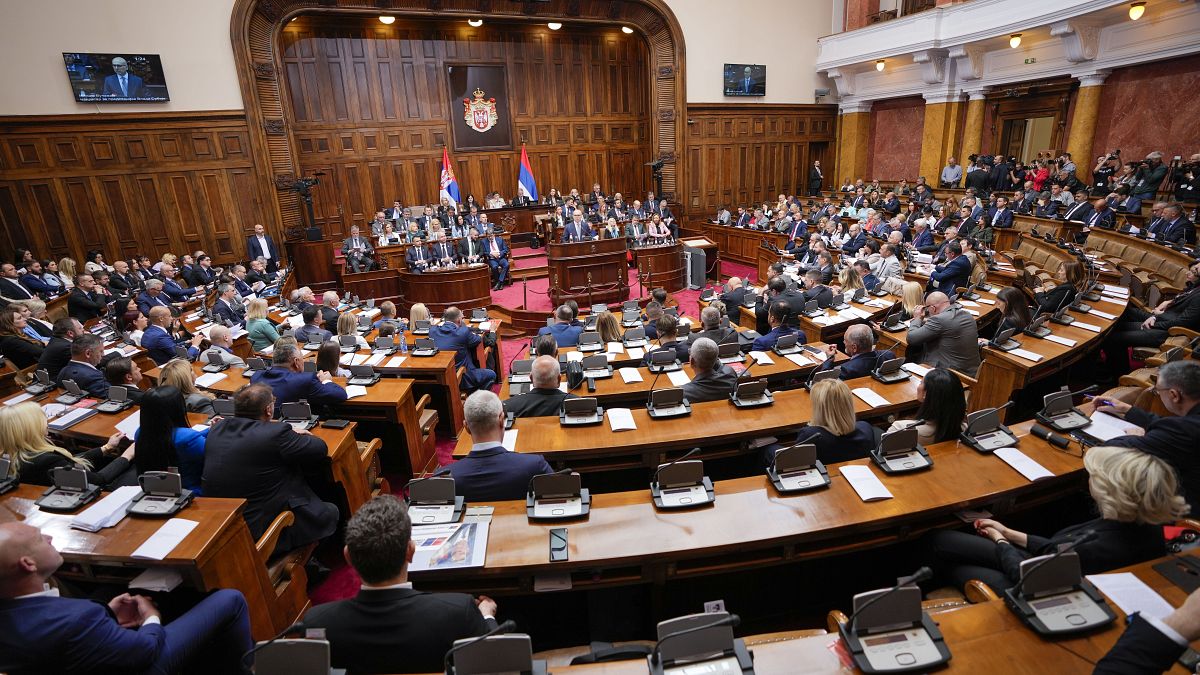World
Israeli strikes in central Gaza kill at least 35 as Netanyahu says war will continue for months

DEIR AL-BALAH, Gaza Strip (AP) — Israeli strikes in central Gaza killed at least 35 people Sunday, hospital officials said, as fighting raged across the tiny enclave a day after Israel’s prime minister said the war will continue for “many more months,” resisting international calls for a cease-fire.
The military said Israeli forces were operating in Gaza’s second-largest city, Khan Younis, and residents reported strikes in the central region, the latest focus of the nearly three-month air and ground war that has now engulfed most of the territory.
The war has raised fears of a broader regional conflagration. The U.S. military said Sunday that its forces shot and killed several Iran-backed Houthi rebels when they tried to attack a cargo ship in the Red Sea, an escalation in a maritime conflict linked to the war in Gaza.
Israel says it wants to destroy Hamas’ governing and military capabilities in Gaza, from where it launched its Oct. 7 attack on southern Israel. The militants killed some 1,200 people and took 240 others hostage after breaking through Israel’s extensive border defenses, shattering its sense of security.
Israel’s unprecedented air and ground offensive has killed more than 21,800 Palestinians and wounded more than 55,000 others, according to the Health Ministry in Hamas-ruled Gaza. The war has sparked a humanitarian crisis, with a quarter of Gaza residents facing starvation, according to the United Nations. Israel’s bombardments have levelled vast swaths of the territory, making parts uninhabitable and displacing some 85% of Gaza’s 2.3 million residents.
ISRAEL PRESSES ON
Israel expanded its offensive to central Gaza this week, targeting a belt of dense, built-up communities that house refugees from the war surrounding Israel’s creation in 1948 and their descendants. The fighting has pushed much of the population south, where people have flooded shelters and tent camps near the border with Egypt, even as Israel has also struck those areas.
In the area of Zweida in central Gaza, an Israeli airstrike killed at least 13 people and wounded dozens of others, according to witnesses. The bodies were draped in white plastic and laid out in front of a hospital, where prayers were held before burial.
“They were innocent people,” said Hussein Siam, whose relatives were among the dead. “Israeli warplanes bombarded the whole family.”
Officials from Al-Aqsa Hospital in central Deir al-Balah said the 13 were among 35 bodies received on Sunday.
The Israeli military said it was battling militants in Khan Younis, where Israel believes Hamas leaders are hiding. It also said its forces operating in the urban Shati refugee camp, in northern Gaza, found a bomb in a kindergarten and defused it. Hamas continued to launch rockets toward southern Israel.
Israel has faced stiff resistance from Hamas since it began its ground offensive in late October, and the military says 172 soldiers have been killed during that time.
THE DAY AFTER FOR GAZA
The magnitude of the destruction in Gaza coupled with the war’s length has raised questions about whether Israel can succeed in its goal of dismantling Hamas and what would come after.
Israeli Prime Minister Benjamin Netanyahu has said Israel must maintain open-ended security control over the Gaza Strip. At a news conference Saturday, he said the war would continue for “many more months” and that Israel would assume control of the Gaza side of the border with Egypt.
“(It) must be in our hands, it must be sealed. It’s clear that any other agreement will not guarantee the demilitarization that we need and require,” Netanyahu said. Israel says Hamas has smuggled weapons from Egypt, but Egypt is likely to oppose any Israeli military presence there.
Netanyahu has also said he won’t allow the internationally-backed Palestinian Authority, which administers some parts of the West Bank, to participate in any future rule over Gaza, putting him at odds with President Joe Biden’s administration, which has provided crucial military aid for the offensive.
The U.S. wants a unified Palestinian government to run both Gaza and parts of the Israeli-occupied West Bank as a precursor to eventual statehood. The last Israeli-Palestinian peace talks broke down over a decade ago, and Israeli government since then have been staunchly opposed to Palestinian statehood.
Israeli media have reported that Netanyahu has repeatedly dodged holding meetings with his War Cabinet about the post-war possibilities.
ISRAELIS PROTEST
Israelis, who still largely stand behind the war’s goals, are showing signs they are losing patience.
On Saturday night, thousands took part in one of the largest demonstrations against Netanyahu since the war began. The country, which is sharply divided over the long-serving leader and a judicial overhaul plan he set in motion before the war, has remained mostly united since Oct. 7.
“It is true that the state of Israel has many enemies and threats, but unfortunately today Prime Minister Netanyahu and his continued rule is the most significant existential threat to our country and our society,” said protester Gal Tzur.
A separate protest Saturday called for the release of the estimated 129 remaining hostages held by Hamas. Families of hostages and their supporters have demanded that the government prioritize hostage releases over other war objectives, and have staged large protests every weekend.
Egypt, one of the mediators between Israel and Hamas, has proposed a multistage plan that would kick off with a swap of hostages for prisoners, accompanied by a temporary cease-fire. A similar deal in November saw Hamas free over 100 hostages and Israel release 240 Palestinian prisoners.
But the sides still appear far from striking a new deal. Both Hamas and the smaller Islamic Jihad militant group say no more hostages will be freed until Israel ends the offensive and withdraws from Gaza.
___
Mroue reported from Beirut and Goldenberg from Tel Aviv, Israel. Associated Press writer Melanie Lidman in Jerusalem contributed to this report.
___
Find more of AP’s coverage at https://apnews.com/hub/israel-hamas-war

World
German author Jenny Erpenbeck wins International Booker Prize for tale of tangled love affair

German author Jenny Erpenbeck and translator Michael Hofmann won the International Booker Prize for fiction on Tuesday for “Kairos,” the story of a tangled love affair during the final years of East Germany’s existence.
The novel beat five other finalists, chosen from 149 submitted novels, for the prize, which recognizes fiction from around the world that has been translated into English and published in the U.K. or Ireland. The 50,000 pounds ($64,000) in prize money is divided between author and translator.
COURT FINES GERMAN-TURKISH AUTHOR OVER ‘DEATH CAMP’ SPEECH
Canadian broadcaster Eleanor Wachtel, who chaired the five-member judging panel, said Erpenbeck’s novel about the relationship between a student and an older writer is “a richly textured evocation of a tormented love affair, the entanglement of personal and national transformations.”
Jenny Erpenbeck, author of Kairos, poses ahead of the International Booker Prize, in London, Tuesday, May 21, 2024. (AP Photo/Alberto Pezzali)
It’s set in the dying days of the German Democratic Republic, leading up to the fall of the Berlin Wall. Erpenbeck, 57, was born and raised in East Berlin, which was part of East Germany until the country disappeared with German reunification in 1990.
“Like the GDR, (the book) starts with optimism and trust, then unravels so badly,” Wachtel said.
She said Hofmann’s translation captures the “eloquence and eccentricities” of Erpenbeck’s prose.
The International Booker Prize is awarded every year. It is run alongside the Booker Prize for English-language fiction, which will be handed out in the fall.
Last year’s winner was another novel about communism and its legacy in Europe, “Time Shelter” by Bulgarian writer Georgi Gospodinov and translated by Angela Rodel.
The prize was set up to boost the profile of fiction in other languages — which accounts for only a small share of books published in Britain — and to salute the underappreciated work of literary translators.
Hoffman is the first male translator to win the International Booker Prize since it launched in its current form in 2016.
World
Serbian parliamentary minnow pushes for 'Russian law' equivalent

The proposed anti-foreign NGO law could bring more attention to the left-wing nationalist Movement of Socialists party, which currently has just two MPs in the 250-seat National Assembly.
Serbia’s Movement of Socialists party has announced it will draft a bill aiming to restrict the activities of foreign non-governmental organisations operating in the Balkan country.
The draft closely resembles the highly controversial law on foreign agents that is expected to be implemented in Georgia soon.
Defending the draft law, Movement of Socialists MP Bojan Torbica said, “Betraying one’s own country and people can no longer be a highly profitable activity.”
The proposed anti-foreign NGO law could bring more attention to the left-wing nationalist party, which currently has just two MPs in the 250-seat National Assembly.
“I really believe that it is a threat to the Republic of Serbia if there are NGOs that are donated from abroad and work here to propagate Kosovo as an independent state, to propagate the genocide in Srebrenica and the destruction of Republika Srpska,” said Đorđe Komlenski, parliamentary leader of the Movement of Socialists.
The three issues — two of which pertain to neighbouring Bosnia and Herzegovina — have been prominent talking points of nationalist politicians in Serbia ever since the disintegration of the former Yugoslavia and a series of bloody wars in the region in the 1990s.
While it is unclear whether Komlenski and Torbica alone can gather enough support to advance the law past the draft stage, civil society actors, such as the Youth Initiative for Human Rights, are concerned that the bill will impact Serbian society’s future.
Marko Milosavljević from Youth Initiative for Human Rights sees the move as a means of intimidating civil society and independent media.
“Through these announcements, we actually see the ban on the advocacy of certain democratic principles is kind of desireable,” Milosavljević said.
Serbian voters will go to the polls on 2 June to participate in a rerun of last year’s local election in 66 electoral units, including the capital, Belgrade.
The EU recently criticised Serbia, a candidate for EU membership, for not conducting free and fair elections, citing allegations of voter fraud.
World
Primo Cancelled at Freevee After ‘Short but Beautiful Run,’ Says Creator

ad
-

 News1 week ago
News1 week agoSkeletal remains found almost 40 years ago identified as woman who disappeared in 1968
-

 World1 week ago
World1 week agoIndia Lok Sabha election 2024 Phase 4: Who votes and what’s at stake?
-

 World1 week ago
World1 week agoUkraine’s military chief admits ‘difficult situation’ in Kharkiv region
-

 Movie Reviews1 week ago
Movie Reviews1 week agoAavesham Movie Review
-

 News1 week ago
News1 week agoTrump, Reciting Songs And Praising Cannibals, Draws Yawns And Raises Eyebrows
-

 World1 week ago
World1 week agoCatalans vote in crucial regional election for the separatist movement
-

 Movie Reviews1 week ago
Movie Reviews1 week agoUnfrosted Movie Review: A sweet origins film which borders on the saccharine
-

 Politics1 week ago
Politics1 week agoNorth Dakota gov, former presidential candidate Doug Burgum front and center at Trump New Jersey rally






/cdn.vox-cdn.com/uploads/chorus_asset/file/25458735/onexplayer_comparo.jpg)








